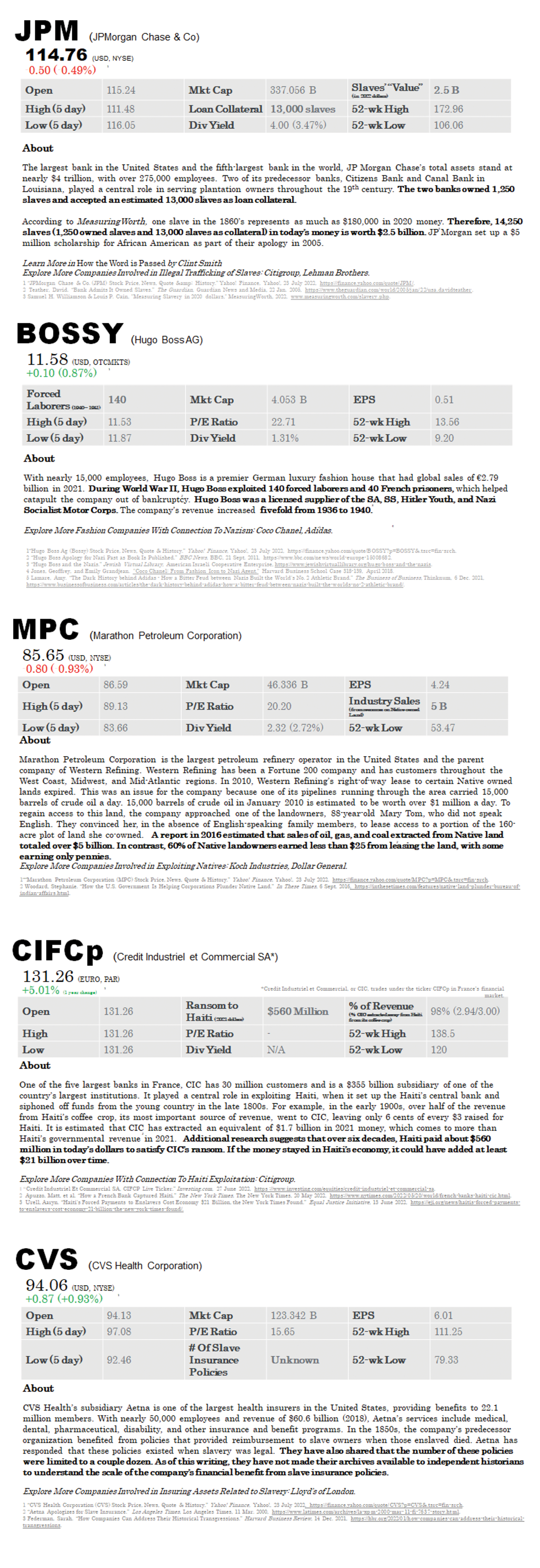
Historical Cash Flows
by Ian Lever, 2022 Business Fellow

Historical Cash Flow seeks to challenge the readers’ perceptions of companies by juxtaposing their financial performance with exploitative actions they have committed in the past. Intentionally designed as a corporate financial outlook, Historical Cash Flow seeks to ask what our expectation of companies are and how we evaluate their impact. Historical Cash Flow shines a light on these exploitative histories by demonstrating how these were not small mishaps with ancillary financial benefits. Rather, they represented deliberate actions that resulted in wealth transfer to the effect of millions or billions of dollars. This list of companies is not exhaustive, but rather has been chosen from different industries to show that this need for historical reckoning is not restricted to one sector. The histories highlighted are not limited to a particular geography, demographic, or time period, showing that the identities of those exploited represent a cacophony of different experiences. This piece was influenced by multiple aspects of the FASPE experience, notably our case conversation on the legacy of Coco Chanel and our evaluation of primary source documents at Wannsee.
The Value of Reparations: In Wannsee, we looked at correspondences of Nassim Zacuoto, a successful Jewish business owner, who lived in Berlin for 26 years and operated a successful carpet business with 14 employees. The fortune accrued through his enterprise was estimated at DM 10 million (German marks) in 1953,1 or $26.61 million (US dollars) in 2022.2 He was forced to leave in 1939. Anti-Semitic laws like The Decree Against the Camouflage of Jewish Firms, forbidding changing the name of Jewish-owned businesses, and The Decree on the Exclusion of Jews from German Economic Life, which effectively shut down all Jewish-owned businesses. Nassim’s enterprise was liquidated in 1941. Two decades after the confiscation of his business, the proposed “goodwill” restitution arrangement in 1961 was DM 28,000, a tiny fraction of what had been forcibly confiscated from him and his family. DM 28,000 awarded for a DM 10 million business. In the case of each corporation highlighted, there exist an ocean of Nassim Zacuotos. They all incurred the costs of expropriation and exploitation in the name of companies’ profits.
The History of Corporations: Coco Chanel: From Fashion Icon to Nazi Agent explores one of the most iconic fashion brands of the last century. The case discusses how Coco Chanel, the founder and namesake of this iconic brand, collaborated with Nazi agents. Sensing the opportunity in collaborating with Nazis, she participated in the “plundering [of] an unoccupied Jewish home” and developed close relationships with many avowed antisemites.3 During the FASPE discussion about this topic, perspectives differed on the company Chanel’s responsibility to right the founder’s wrongs committed nearly eight decades ago. But there was near unanimous agreement that this history of the company and founder were not part of the consciousness of the typical modern-day consumer. Research into other companies like IBM, Volkswagen, and Adidas after the trip revealed the degree to which companies utilized their capabilities, relationships, and know-how to perpetuate and benefit from the Holocaust. This piece, Historical Cash Flow, seeks to replicate the exercise of our FASPE Coco Chanel discussion by highlighting a handful of corporations, thereby initiating a deeper reckoning with complicated histories.
Ian Lever was a 2022 FASPE Business Fellow. He is a management consultant at Accenture.
Notes
- “German Mark to US Dollar Rate Today DEM/USD.” Mataf, 2022,
- https://www.mataf.net/en/currency/converter-DEM-USD?m1=50.97. Dipl. Ing. Udo Marx, München. “German Inflation Calculator to Factor Inflation into Any Calculation.” German Inflation Rate Calculator to Calculate Price Change, Calculator for German Family Law, 2022, https://www.lawyerdb.de/Inflationrate.aspx.
- Jones, Geoffrey, and Emily Grandjean. "Coco Chanel: From Fashion Icon to Nazi Agent." Harvard Business School Case 318-139, April 2018.
